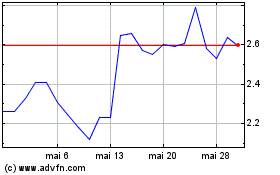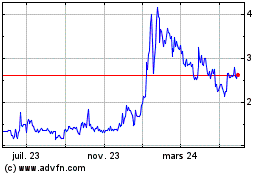Adagene Inc. (“Adagene”) (Nasdaq: ADAG), a company transforming the
discovery and development of novel antibody-based therapies, today
announced new ADG126 clinical data presented at the ESMO Congress,
taking place in Barcelona, Spain, September 13-17.
The poster, titled Increased Therapeutic Index
of Muzastotug (ADG126), a Masked Anti-CTLA-4 Antibody, in
Combination with Pembrolizumab (Pembro) Enables Significant
Clinical Benefits and Supports Further Clinical Development in
Patients with Metastatic MSS CRC, reports data from an ongoing
phase 1b/2 trial of Adagene’s masked anti-CTLA-4 SAFEbody in
combination with Merck & Co., Inc., Rahway, NJ, USA's anti-PD-1
therapy KEYTRUDA® (pembrolizumab) (ADG126-P001; NCT05405595).
“I am delighted that the ESMO data show a
promising overall response rate, progression-free survival (PFS)
and early survival benefit from treatment with the immunotherapy
(IO) doublet of ADG126 in combination with pembrolizumab for
patients with advanced/metastatic MSS CRC, the largest segment of
colorectal cancer with few treatment options,” said Daneng Li, MD,
Associate Professor in the Department of Medical Oncology &
Therapeutics Research at the City of Hope Comprehensive Cancer
Center, and a study investigator. “With a much higher dosing level
than available anti-CTLA-4 therapies, these data reinforce the
encouraging safety and efficacy profile for ADG126 administered
repeatedly in MSS CRC.”
Dr. Li continued, “Given the best-in-class
potential for ADG126, this combination with pembrolizumab could
address even broader patient populations, such as those with
liver metastases, particularly if combined with standard of care to
control early disease progression. Further, the safety profile of
this immunotherapy doublet enables repeat cycles to achieve and
sustain sufficient drug exposure that maximizes potential for
a long-term survival benefit.”
ADG126 is a masked anti-CTLA-4 SAFEbody targeting a unique
epitope of CTLA-4 on regulatory T cells (Tregs) in tumor tissue
which shows potential best-in-class safety and efficacy profiles in
combination with pembrolizumab. The unique epitope of ADG126 alone
has shown enhanced antibody-dependent cell mediated cytotoxicity
without Fc engineering, which is associated with significantly
increased toxicity. Further, it has shown minimal immunogenicity
and anti-drug antibodies, with no impact on its pharmacokinetic
(PK) profile.
Key highlights from the poster (July 30,
2024 data cutoff) include:
- ADG126 in combination with pembrolizumab continued to
demonstrate a differentiated safety profile in dose escalation and
dose expansion cohorts for heavily pre-treated advanced/metastatic
patients with solid tumors (n=66):
- No dose-limiting toxicities (DLT) or Grade 4 or 5 TRAEs were
observed at any dose up to 20 mg/kg Q3W, which was evaluated in
dose escalation (n=6) to support an ongoing loading dose
cohort.
- No Grade 3 colitis was observed at any dose, with limited use
of infliximab to manage immune-mediated diarrhea/colitis in no more
than 10% of patients.
- No significant late-onset toxicities were observed after repeat
dosing at the 10 mg/kg dose level. TRAEs by week from treatment
start are summarized in the poster.
- Grade 3 TRAEs occurred in only 6% of patients at the 10 mg/kg
Q6W dose (1/17) and 16% of patients at the 10 mg/kg Q3W dose
(6/37). Standard of care treatments are associated with higher
rates of toxicities.
- Seven patients developed treatment related SAEs; however, the
discontinuation rate remains low at 8% (5/66).
- ADG126 administered at 10 mg/kg Q6W or Q3W in combination with
pembrolizumab (200 mg/Q3W) demonstrated an encouraging efficacy
signal, durable disease control and an early survival benefit in
MSS CRC patients, with dose-dependent efficacy and objective
responses per RECIST criteria observed for the Q3W schedule:
- In the subset of efficacy evaluable patients without liver and
peritoneal metastases (n=17) who received ADG126 10 mg/kg Q3W, an
ORR of 24% was observed, including four confirmed PRs. These
results are consistent with earlier ORR data published at ASCO GI
2024. Response rates for current standard of care treatments range
from 1% to 6.3%*.
- An additional 11 patients had stable disease (SD) for an
overall disease control rate (DCR) of 88% (15/17).
- Further, a median PFS of 8.5 months was observed in the subset
at the ADG126 10 mg/kg Q3W dose and median PFS was 5.9 months for
patients at the ADG126 10 mg/kg Q6W dose.
- The 12-month OS rates were 74% for those patients without liver
metastases (n=36), and 82% in those without liver and peritoneal
metastases (n=24) in the combined 10 mg/kg Q6W and Q3W
cohorts.
- While the 10 mg/kg Q3W cohort demonstrated efficacy with RECIST
responses and the Q6W did not, early OS rates appear comparable for
both doses. This suggests that the Q6W could be used as a starting
point for future combination trials, or as a dose modification
strategy for safety management.
- Additionally, results in patients without liver metastases who
received at least four cycles of the combination showed comparable
OS rates to those without liver and peritoneal metastases,
highlighting the importance of early disease control with standard
of care to enable the IO doublet to drive a long-term survival
benefit.
- In dose escalation, the 20 mg/kg Q3W dose level was tolerable
for the initial cycle (n=6). Based upon the safety profile of the
initial dose, 20 mg/kg is being evaluated as a loading dose in an
expansion cohort that has enrolled 12 patients. This cohort is
evaluating a single dose of ADG126 at 20 mg/kg followed by a 10
mg/kg Q3W maintenance dose in combination with pembrolizumab.
Initial data for this cohort are expected later this year.
- Comprehensive PK and exposure response analyses were also
conducted to provide insight on various dosing regimens and their
correlation to safety and efficacy of the combination. These
results reinforce the increased therapeutic index of ADG126,
underscoring a key advantage of the SAFEbody® precision masking
technology. The extensive PK data also guide future clinical
development and dose selection to meet FDA’s Project Optimus dose
optimization requirements.
Commenting on these promising results, Peter Luo, Adagene’s CEO
and President of R&D said, “We are thrilled that today’s update
continues to reinforce the clinical benefits of the best-in-class
therapeutic potential for ADG126 at the 10 mg/kg dose level in
combination with pembrolizumab in MSS CRC. Armed with these results
and the anticipated findings from our ongoing 20 mg/kg loading dose
regimen, we are moving ahead with plans to evaluate ADG126 in MSS
CRC at 10- to 20-fold higher doses than ipilimumab in a randomized,
registration-oriented clinical program. With safety comparable to
historical data for pembrolizumab monotherapy, these data provide a
solid foundation for the potential of an IO doublet targeting
CTLA-4 and PD-1 to move into earlier lines of therapy and broader
patient populations, particularly when combined with standard of
care aiming for a transformational improvement in patient
outcomes.”
KEYTRUDA® is a registered trademark of Merck Sharp &
Dohme LLC, a subsidiary of Merck & Co., Inc., Rahway, NJ,
USA.
SAFEbody® is a registered trademark in the United
States, China, Australia, Japan, Singapore, and
the European Union.
*Grothey et al. Lancet. 2013;381: 303-312; FDA label,
12/10/2020.
Mayer et al. N Eng J Med. 2015;372:
1909-1919. Marcus et al. Clin Cancer Res; 23(12) June 15,
2017;2924-2927. Josep Tabernero et al. 2023 ASCO
Gastrointestinal. Gerald W. Prager et al. N Engl J Med 2023 May
04;388(18). Shukui Qin et al. 2019 CSCO. Jin Li et al.
JAMA. 2018;319(24): 2486-2496.
Andrea J. Bullock et al. 2023 ESMO-GI.
Anthony B et al. 2023 ASCO-GI.
Elena et al. 2021 ASCO. E. Garralda et al. 2022
ESMO.
About AdageneAdagene Inc. (Nasdaq:
ADAG) is a platform-driven, clinical-stage biotechnology company
committed to transforming the discovery and development of novel
antibody-based cancer immunotherapies. Adagene combines
computational biology and artificial intelligence to design novel
antibodies that address globally unmet patient needs. The company
has forged strategic collaborations with reputable global partners
that leverage its SAFEbody® precision masking technology in
multiple approaches at the vanguard of science.
Powered by its proprietary Dynamic Precision
Library (DPL) platform, composed of NEObody™, SAFEbody, and
POWERbody™ technologies, Adagene’s highly differentiated pipeline
features novel immunotherapy programs. The company’s SAFEbody
technology is designed to address safety and tolerability
challenges associated with many antibody therapeutics by using
precision masking technology to shield the binding domain of the
biologic therapy. Through activation in the tumor microenvironment,
this allows for tumor-specific targeting of antibodies in tumor
microenvironment, while minimizing on-target off-tumor toxicity in
healthy tissues.
Adagene’s lead clinical program, ADG126 (Muzastotug), is a
masked, anti-CTLA-4 SAFEbody that targets a unique epitope of
CTLA-4 in regulatory T cells (Tregs) in the tumor microenvironment.
ADG126 is currently in phase 1b/2 clinical studies in combination
with anti-PD-1 therapy, particularly focused on Metastatic
Microsatellite-stable (MSS) Colorectal Cancer (CRC). Validated by
ongoing clinical research, the SAFEbody platform can be applied to
a wide variety of antibody-based therapeutic modalities, including
Fc empowered antibodies, antibody-drug conjugates, and
bi/multispecific T-cell engagers.
For more information, please
visit: https://investor.adagene.com.Follow Adagene on WeChat, LinkedIn and Twitter.
Safe Harbor StatementThis press release
contains forward-looking statements, including statements regarding
certain clinical results of ADG126, the potential implications of
clinical data for patients, and Adagene’s advancement of, and
anticipated preclinical activities, clinical development,
regulatory milestones, and commercialization of its product
candidates. Actual results may differ materially from those
indicated in the forward-looking statements as a result of various
important factors, including but not limited to Adagene’s ability
to demonstrate the safety and efficacy of its drug candidates; the
clinical results for its drug candidates, which may not support
further development or regulatory approval; the content and timing
of decisions made by the relevant regulatory authorities regarding
regulatory approval of Adagene’s drug candidates; Adagene’s ability
to achieve commercial success for its drug candidates, if approved;
Adagene’s ability to obtain and maintain protection of intellectual
property for its technology and drugs; Adagene’s reliance on third
parties to conduct drug development, manufacturing and other
services; Adagene’s limited operating history and Adagene’s ability
to obtain additional funding for operations and to complete the
development and commercialization of its drug candidates; Adagene’s
ability to enter into additional collaboration agreements beyond
its existing strategic partnerships or collaborations, and the
impact of the COVID-19 pandemic on Adagene’s clinical development,
commercial and other operations, as well as those risks more fully
discussed in the “Risk Factors” section in Adagene’s filings with
the U.S. Securities and Exchange Commission. All
forward-looking statements are based on information currently
available to Adagene, and Adagene undertakes no
obligation to publicly update or revise any forward-looking
statements, whether as a result of new information, future events
or otherwise, except as may be required by law.
Investor & Media Contact:Ami
KnoeflerAdagene650-739-9952ir@adagene.com
Adagene (NASDAQ:ADAG)
Graphique Historique de l'Action
De Nov 2024 à Déc 2024

Adagene (NASDAQ:ADAG)
Graphique Historique de l'Action
De Déc 2023 à Déc 2024
